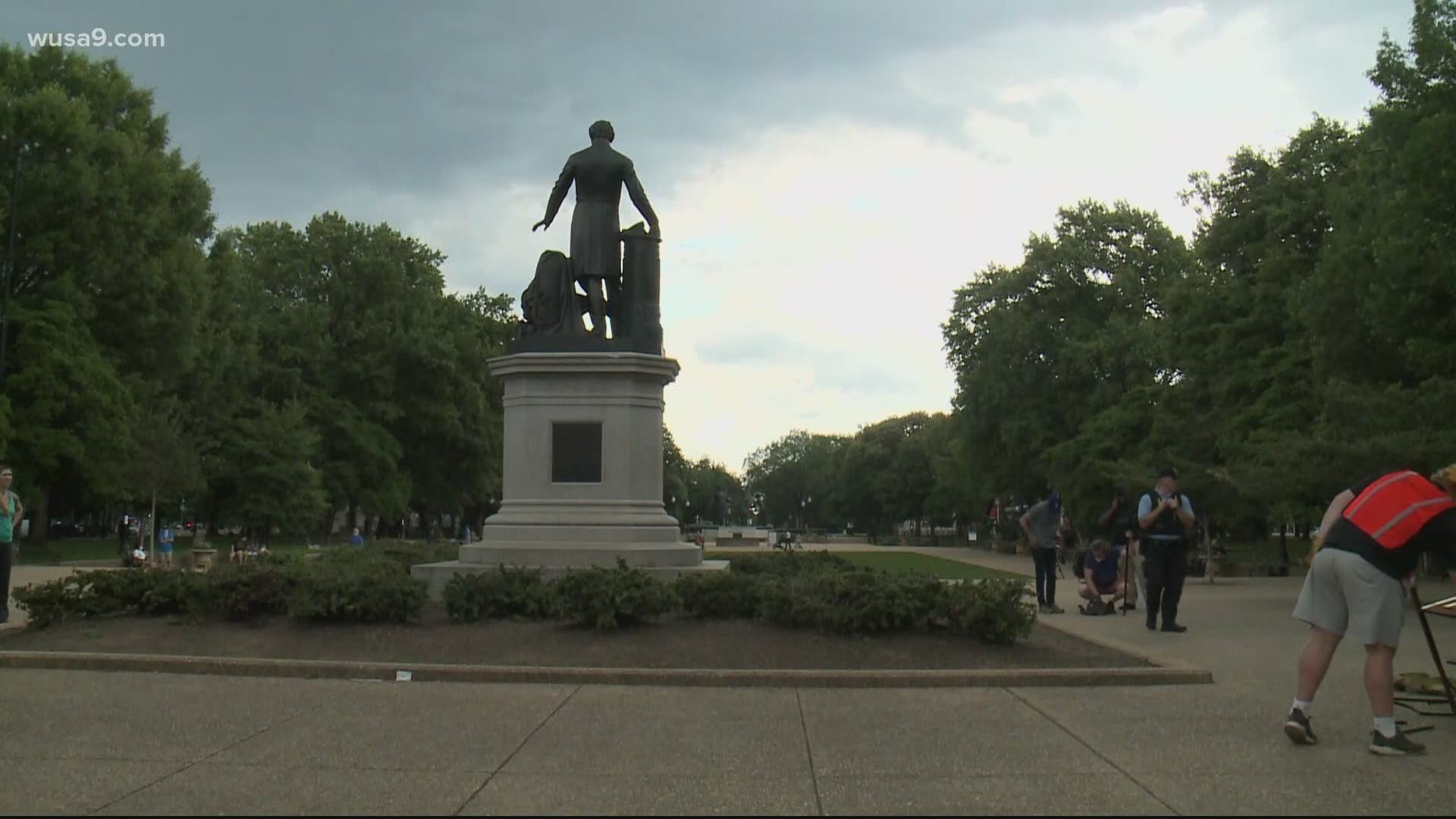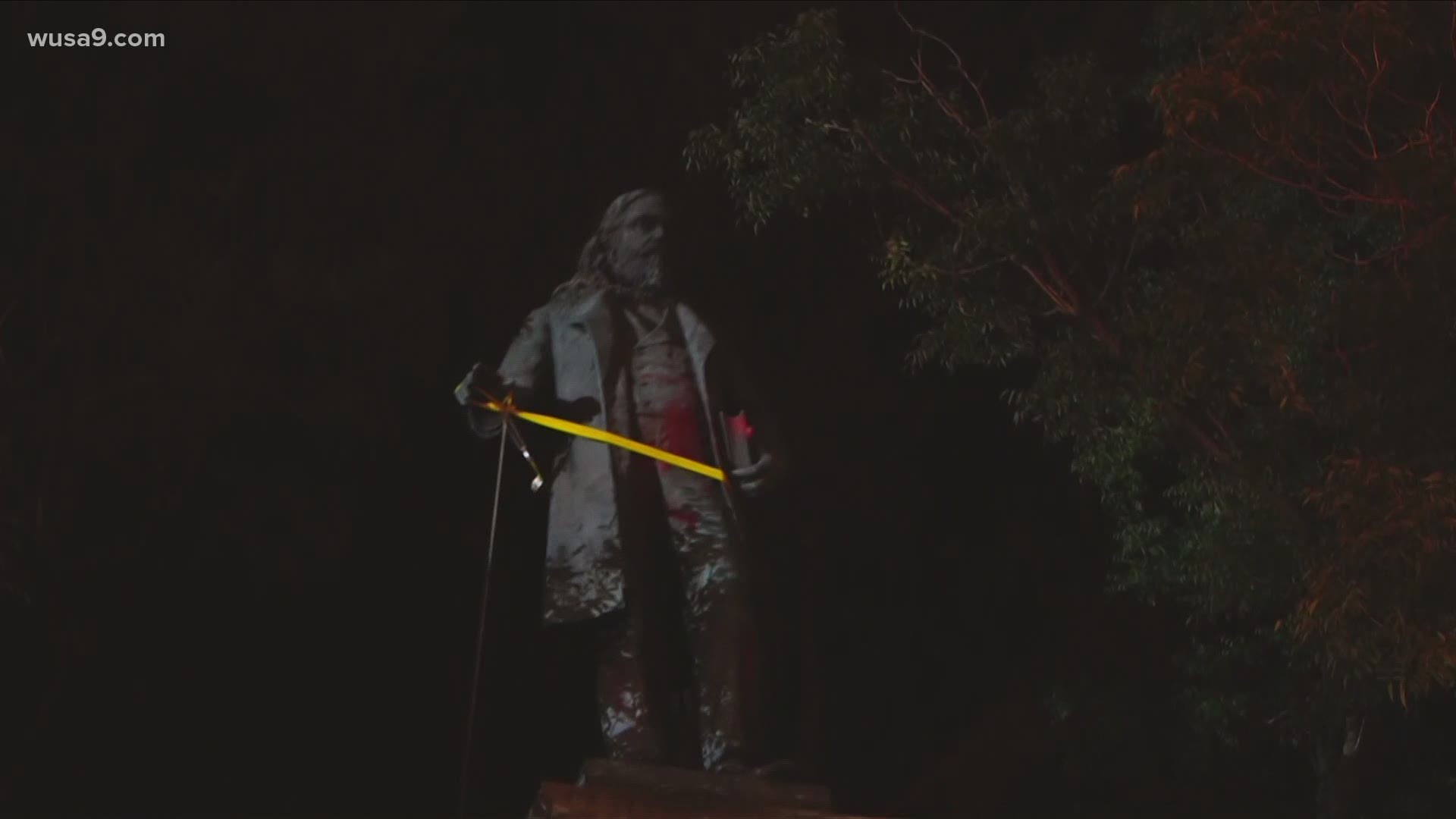WASHINGTON — For the second night this week, "The Freedom Neighborhood" has organized a rally at the base of the Emancipation Monument in Lincoln Park, calling for the removal of the statue. After crowds convened at the statue Tuesday, it is now surrounded by fencing and concrete barriers.
Not all who came to the rally Friday were in favor of the statue being torn down. But organizers said the goal for the evening was for "everyone to engage in conversations about the statue and race."
A heated debate broke out between some of the older supporters of the statue saying it should stay, and the younger protesters saying the older generation "had their time to address this."
The Emancipation statue, at the center of Lincoln Park, depicts President Abraham Lincoln standing over a freed enslaved African American who appears to be kneeling at his feet with broken shackles around his wrists. The statue was erected in 1876 to pay homage to the president, but many have taken issue with its "degrading racial undertones," as described in a new petition.
Marcus Goodwin, a D.C. native and candidate for an at-large seat on the D.C. Council, started an online petition, saying the statue stirred up a lot of thoughts and emotion about racial inequality in America and imagery that depicts African Americans as inferior to others.
“I think we should all move to see better symbols in society that show all people being equal,” he said.
WUSA9 reporter Tom Dempsey spoke with the cousin of boxing legend Muhammad Ali, Keith Winstead, who said that he became interested in the story of Archer Alexander, the man depicted on the statue with Lincoln, after taking a DNA test and learning that he and Ali were descendants of Alexander.
"If everybody knew that he was breaking the chains from his ankles in the process of standing, they would look at it differently," Winstead said. "He wasn't being subservient to anybody. If people knew about Archer Alexander and how he lived and what he did, they would take pride in seeing that memorial."
The group did not make an attempt to remove the statue Tuesday night, but announced that they would return Thursday. Due to weather conditions, they returned Friday instead.
Organizers have said they want the Emancipation Statue "gone" and openly said they will not be working with police.
"To achieve true justice, we are not working with the police, nor will we seek any relationship with them," the group wrote in an Instagram post advertising the protest. "In order to create change, we will do so by any means necessary. If you want a revolution, it won’t happen by being peaceful."
RELATED: Protesters, police clash in Lafayette Square after trying to tear down Andrew Jackson statue
Rep. Eleanor Holmes Norton also wants the Emancipation Memorial removed, and said she will look to introduce legislation in the House of Representatives if the National Park Service cannot remove it.
“Because Lincoln Park is National Park Service (NPS) land, I will work with the NPS to see whether NPS has the authority to remove the statue without an act of Congress, and if so, we will seek its removal without a bill," said Norton in a statement from her office. "This statue has been controversial from the start. It is time it was placed in a museum.”
The bronze memorial statue was erected in 1876 to honor Abraham Lincoln for the Emancipation Proclamation and was put up 11 years to the day that he was assassinated at the Ford's Theater by John Wilkes Booth.
“Although formerly enslaved Americans paid for this statue to be built in 1876, the design and sculpting process was done without their input, and it shows. The statue fails to note in any way how enslaved African Americans pushed for their own emancipation," Norton said. "Understandably, they were only recently liberated from slavery and were grateful for any recognition of their freedom. However, in his keynote address at the unveiling of this statue, Frederick Douglass also expressed his displeasure with the statue."
Norton said in an interview with WUSA9 that the Andrew Jackson statue also needs to come down, and she is looking at steps she can take to move forward with that idea within her own office.
A statue of a Confederate general was torn down and burned by protesters on Juneteenth outside D.C. Police headquarters. The statue, of Brigadier General Albert Pike, was the only outdoor statue depicting a member of the Confederacy, but there are more than a dozen located indoors throughout the District.
The Emancipation Memorial statue originally faced the Capitol, but when a statue celebrating African American educator Mary McLeod Bethune was erected in the eastern half of Lincoln Park, the Emancipation Memorial was rotated 180 degrees so the two statues would face each other.


